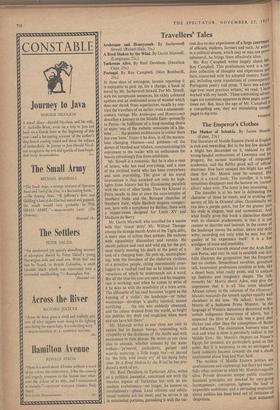The Emperor's Clothes
The Market of Seleukia. By James Morris. (Faber, 25s.) THE literature of Middle Eastern travel in English is rich and rewarding. But in the last few decades a blight has descended on it, induced by the wrong-headed enthusiasms of Lawrence and his progeny, the earnest bumblings of misguided academics, and the flabby good will of official doctrines. Few have escaped this blight but with these few Mr. Morris must be counted. His book is a travel book. The traveller, it is true, sometimes disappears and the lecturer on `current affairs' takes over. The latter is less interesting.
The traveller is at his best in delineating the character of those he •meets, and in evoking the savour of life in Oriental cities. Occasionally We run into a purple patch, but for the greater part his style is elegant, taut and economical. And what finally gives this book a distinction shared with its classical predecessors, is that it is not content to describe and instruct; in the centre of the landscape moves the author, aware and drily witty, recording not only what he sees, but the quality of his experience itself : it is a fine amalgam of sense and sensibility.
Mr. Morris's travels extend over the Arab East and Persia, and may be said to establish and skil- fully illustrate the proposition that the Emperor has no clothes. Streamlined novelties, grandiose talk, benevolent professions combine to hide, like a desert haze, what really exists, and to conjure up fantastic and imaginary shapes. The talk, remarks Mr. Morris about Aden, may give the impression that it is all 'like some idealised African colony in the columns of the Observer.' Mutatis mutandis the remark applies equally well elsewhere in the area. 'He talked,' writes Mr- Morris of a Sudanese Prime Minister, 'in the language of Western democracy decorated with a certain indigenous floweriness of idiom; but I suspected the fibre of his talk was a good deal thicker and older than the conceptions of Burke and Jefferson.' The disjunction between what is said and what is done is peculiarly radical in the Middle East : Mr. Morris's chapters on Nasser's Egypt, for instance, are particularly good on this point. But it is surprising to see so astringent a book suddenly become towards the end a shade sentimental about Iraq and Nuri Said.
The realities of Middle Eastern politics are unwholesome and unpleasing; but there are merci- fully other realities to which Mr. Morris is equally alive. Private decencies temper public cruelties; fanatical principles are mocked by easy-going incompetence; corruption lightens the load of impossible ambitions; and a pervading scepticism about politics has been bred out of centuries of










































































 Previous page
Previous page